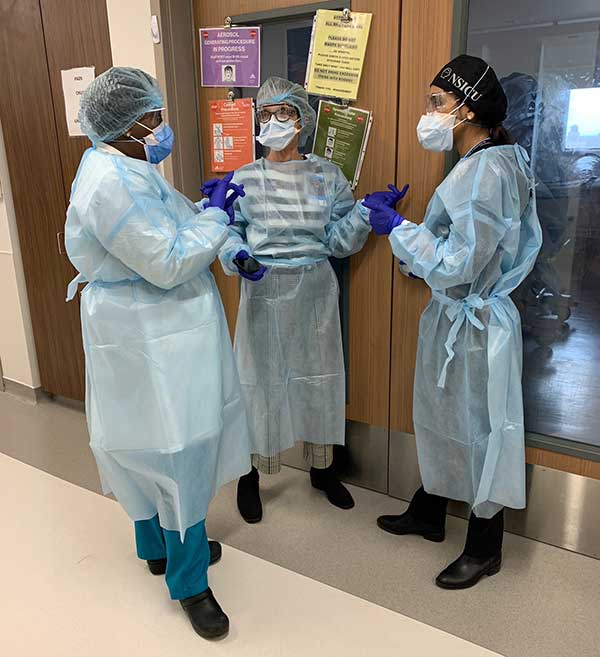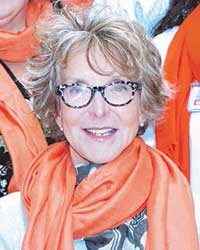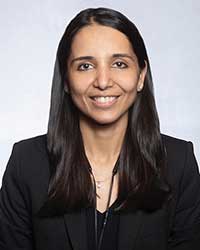Being a Part of Something Bigger Than Ourselves
By: Maggie Keogh, M.Ed, BCC, and Neha Dangayach, MD, MSCR
April 23, 2021
Maggie Keogh, M.Ed, BCC, is a spiritual care provider (hospital chaplain) of Buddhist philosophy and Director, Staff Engagement Chi Program and ICU Spiritual Care, at The Mount Sinai Hospital in New York City. Neha Dangayach, MD, MSCR, is a neurointensivist and Founder and Director of the Neuroemergencies Management and Transfers Program and the Mount Sinai Critical Care Recovery Program.
When a new, state-of-the-art Neurosciences ICU (NSICU) opened at The Mount Sinai Hospital in October 2019, Maggie was asked to bless the new unit. At that time, little did we know that New York City would become the epicenter of the first COVID-19 wave, and that by March 2020, our 18-bed ICU would be transformed in record time to a COVID-19 unit, one of the 11 such ICUs created at The Mount Sinai Hospital.
Maggie: During the first wave, I remember walking through my units a bit aimlessly: There were no family members allowed, and I could not go into patients’ rooms. I was scared of the unknown just like everyone else.
However, I quickly realized that the people who needed my help now were the staff. Even simple gestures or questions, like “How are you doing today?” would move staff to tears; one nurse answered, “I can’t look at you, or I will just fall down and cry.” I said many silent blessings.
By April, Neha had already set up a virtual morning and evening meditation sessions for the team. I found my footing by being the liaison between family and patient with my FaceTime app, as well as the go-between for the social workers and palliative care team members who were working remotely. The nurses were grateful because one of the deep sorrows was having to watch someone die alone. There were many calls between loved ones and patients who were on respirators and mostly unconscious; mothers, sisters, children, and spouses implored God for miracles. Being an ICU chaplain, this kind of deep sadness and grief was not new to me, but the volume of those in need was. Room after room, day after day, it wasn’t something anyone could have prepared for.
By April, I didn’t recognize many of the neuro team because we had many visiting nurses and doctors who had traveled to this first epicenter of the COVID-19 surge. I felt alone and useless most often, but I relied on my internal compass that directed me to show up—just show up and be present with an open mind and heart.
 Unit team members (from left) Elka Riley, Maggie Keogh, and Neha Dangayach confer about how to best support a patient with COVID-19 and their loved ones.
Unit team members (from left) Elka Riley, Maggie Keogh, and Neha Dangayach confer about how to best support a patient with COVID-19 and their loved ones.
Neha: There are times that affirm our purpose in life, that remind us why we are doing what we are doing. COVID-19 was that time for me. I knew no matter what, we will get through this. As an intensivist, I have learned to give it my best and leave the rest to something much bigger than I am.
Maggie and I have often discussed the meaning of it all and how to comfort patients and families in pain. I would start my rounds in the COVID-19 unit with a huddle to create the time and space for acknowledging fear, uncertainty, and gratitude for one another. Creating that psychological safety gave me peace.
During one of my first service days in a COVID-19 ICU when we ran our fourth unsuccessful code of the day, I could see too many broken hearts and despair in the eyes of my team members. We paused for the lives we lost, and we reminded one another that it is a position of great honor to let no one die alone due to the limitations on family visitation. We said silent prayers for those who didn’t have families. Maggie organized group Zoom check-ins for team members to unpack and process.
When one of our older patients was extubated and getting ready to go home from the ICU, we all stopped everything that we were doing to not only feel the joy for that patient, but also express our gratitude for the ability and spirit to take care of each other.

Maggie Keogh is a spiritual care provider (hospital chaplain) of Buddhist philosophy and a contented spiritual nomad. One of her units is the NSICU at The Mount Sinai Hospital, where she first met Dr. Neha Dangayach 6 years ago. In her pre-COVID-19 role, she worked with patients and their loved ones to help them find meaning in their critical illness, survivorship, and mortality.

Neha Dangayach, MD, is a neurointensivist and Founder and Director of the Mount Sinai Critical Care Recovery Program. Dr. Dangayach and Chaplain Keogh have built a strong, spiritual relationship throughout their time at Mount Sinai and have discussed ways of incorporating spiritual care beyond end of life in the NSICU and Critical Care Recovery Clinic.
Read more COVID-19: Voices From the Community blog posts:
CHEST’s COVID-19 Task Force – The Secrets Behind Our Success
How COVID-19 Turned Our Hospital—and Patients—Upside Down
Medical Publishing in a COVID-19 World: How the Journal CHEST Adapted and Evolved